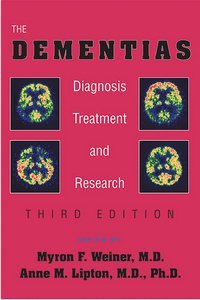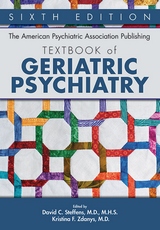The Dementias, Third Edition
Diagnosis, Treatment, and Research
View Pricing
Description
Confusion. Fear. Isolation. This is the human experience of dementing illness, and it is at the heart of this practical, informative volume by a broad range of clinically grounded experts.
This book is designed to meet the needs of clinicians dealing with persons with dementing illness and to serve as an introduction to the pathophysiology of dementing illness and a resource for clinical investigators.
The giant strides in dementia research since the publication of the first edition in 1991 have generated optimism that we will soon be able to delay onset and even prevent these diseases that devastate both patients and caregivers. This third edition has been revised, updated, and expanded to cover changes in the classification, management and treatment of dementing illnesses and to give a more extensive account of basic and clinical research findings. At the same time, this remarkable volume indicates the interaction of the patient's personality, the caregiver, and the environment with the pathophysiology of dementing illnesses that creates the variety of symptoms accompanying these illnesses and impacting their treatment.
Like the second edition, this third edition has three sections, flowing from diagnosis through management/treatment to research. New to this edition are
- A world-class presentation on the molecular and genetic basis of Alzheimer's disease
- A beautifully illustrated chapter on contemporary neuroimaging
- Discussions of mild cognitive impairment, the frontotemporal dementias, and the dementias associated with Lewy bodies
This third edition is exceptionally valuable for addressing the day-to-day challenges of dealing effectively and humanely with persons with dementing illness. Case examples are used in the chapters on psychological/behavioral and drug management to indicate practical approaches to maintaining patients at their optimal level of function. Unlike similar texts, this volume also reviews legal and ethical issues in the care of persons with dementing illness and shows how clinicians and caregivers how to mobilize community resources. Extensive reference lists round out each chapter. The book concludes with 11 assessment guides and rating scales and an index.
Now more than ever, there is hope that advances in understanding dementing illnesses such as Alzheimer's disease will lead to their effective treatment, and ultimately to their prevention. Until then, clinicians, families, and society will continue to be faced with the challenges posed by these illnesses—making this book a must read for physicians and other health care professionals, whether in training, in practice, or engaged in clinical research.
Contents
- Contributors
- Foreword
- Introduction
- Chapter 1. Clinical Diagnosis of Cognitive Dysfunction and Dementing Illness
- Chapter 2. Dementing Illness as a Psychobiological Process
- Chapter 3. Medical Evaluation
- Chapter 4. Neuroimaging
- Chapter 5. Differential Diagnosis
- Chapter 6. Psychological and Behavioral Management
- Chapter 7. Drugs for Behavioral, Psychological, and Cognitive Symptoms
- Chapter 8. Evaluation of Cognitive Functions
- Chapter 9. Supporting Family Caregivers
- Chapter 10. Legal and Ethical Issues
- Chapter 11. Mobilizing Community Resources
- Chapter 12. Nursing Care for Persons With Cognitive Impairment
- Chapter 13. Structuring Environments for Persons With Cognitive Impairment
- Chapter 14. Advances in the Molecular and Genetic Basis of Alzheimer's Disease
- Chapter 15. Advances in the Treatment of Alzheimer's Disease
- Appendix A: Dementia Questionnaire
- Appendix B: Mental Status Examination
- Appendix C: Neurological Examination
- Appendix D: Blessed Dementia Rating Scale
- Appendix E: Washington University Clinical Dementia Rating Scale
- Appendix F: Alzheimer's Disease Assessment Scale
- Appendix G: Neuropsychiatric Inventory: Community Dwelling Version
- Appendix H: Agitated Behavior in Dementia Scale
- Appendix I: Quality of Life in Alzheimer's Disease Scale
- Appendix J: Quality of Life in Late-Stage Dementia (QUALID) Scale
- Appendix K: Abnormal Involuntary Movement Scale (AIMS)
- Appendix L: Resources
- Index
About the Authors
Myron F. Weiner, M.D., is Professor of Psychiatry, Associate Professor of Neurology, Aradine S. Ard Chair in Brain Science, and Dorothy L. and John P. Harbin Chair in Alzheimer's Disease Research at the University of Texas Southwestern Medical Center at Dallas.
Anne M. Lipton, M.D., Ph.D., is Assistant Professor of Neurology and Psychiatry at the University of Texas Southwestern Medical Center at Dallas.
Related Products
Carousel Control - items will scroll by tabbing through them, otherwise arrows can be used to scroll one item at a time








